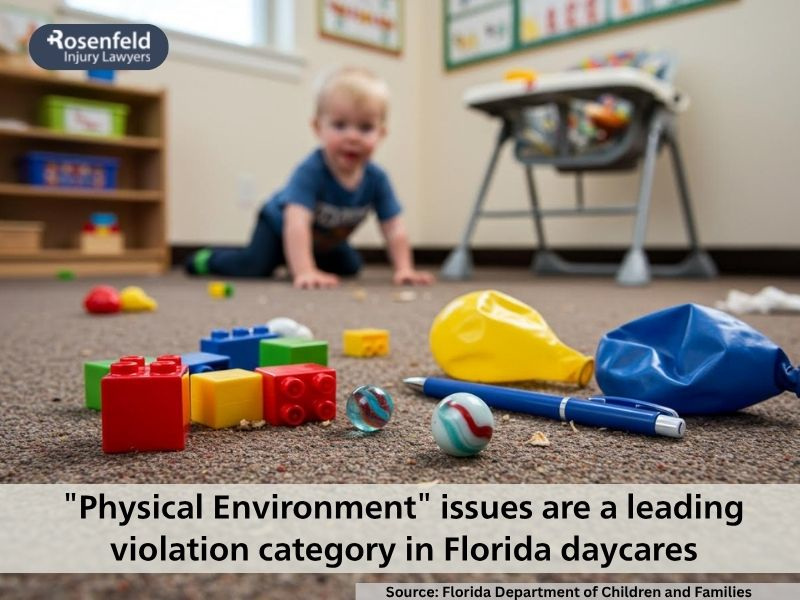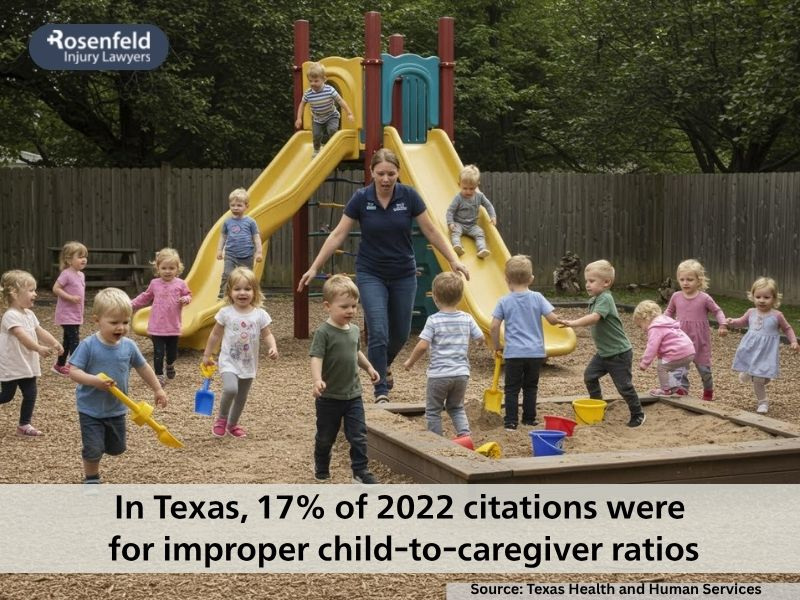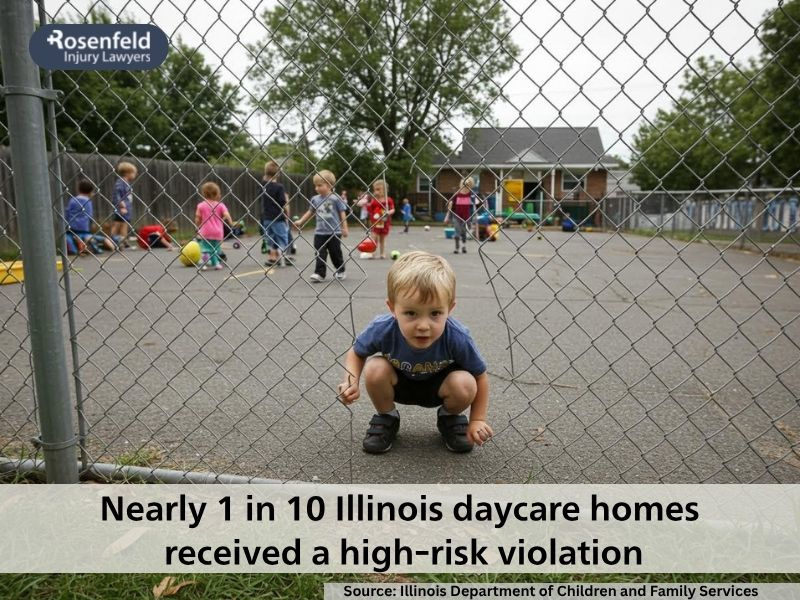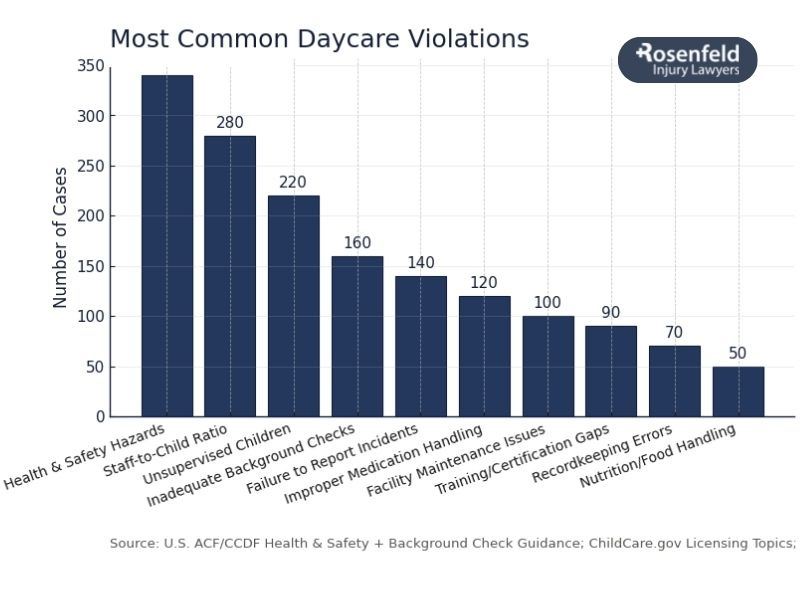What Are Daycare Violations?
Daycare violations are breaches of state child care regulations or safety standards that put children’s health, safety, or development at risk. Violations can range from administrative oversights, such as incomplete staff records, to severe incidents involving neglect or abuse.
All licensed family child care providers and larger child care programs must comply with state and federal requirements. These laws cover a wide range of areas, including child-to-staff ratios, supervision rules, hygiene practices, safety protocols, and staff background checks.
Not all violations involve direct abuse. Some may include cutting corners during daily routines, such as leaving infants unattended during naptime or skipping required sanitation procedures. While some of these may be corrected with staff training or policy changes, repeated violations–or any that involve serious harm–can lead to license suspension, civil penalties, or even criminal investigations.
This article explains what types of violations are most common in child care settings, how state child care licensing offices investigate complaints and reports, and what legal options are available to families if a child is harmed due to a provider’s failure to follow the law.

What Are Common Examples of Daycare Violations?
Child care violations often follow patterns that reveal larger issues in how a child care program is operated. These violations may seem minor on paper, but they can create unsafe environments that put children at risk of serious harm. Below are some of the most common types of violations reported to state child care licensing offices, along with the federal regulations they violate.
Health and Safety Violations
Dirty bathrooms, mold on ceilings, spoiled food, and insect infestations are common signs of health and safety failures in child care settings. These problems are not just unpleasant–they put children at risk of infection, respiratory issues, and exposure to toxic substances. Under 45 C.F.R. § 1302.47, all licensed child care programs are required to implement health practices that prevent the spread of disease, ensure safe food handling, and maintain sanitary environments.
Supervision and Staffing Violations
Children must be closely supervised at all times. When staff leave children unattended–during naps, diaper changes, or transitions–serious accidents can happen. Some daycares also fail to follow required child-to-staff ratios or hire employees without running complete background checks. These are violations of 45 C.F.R. § 1302.90(b)(1), which outlines federal standards for staff qualifications and screening. Hiring unvetted workers or cutting corners on staffing can place children in unsafe conditions and expose programs to civil or criminal liability.
Facility and Equipment Violations
Broken high chairs, cracked crib slats, exposed electrical cords, and loose playground equipment are common facility hazards that violate child care safety rules. Licensed programs are required to inspect and maintain all furniture, toys, and materials used by children. Under 45 C.F.R. § 1302.47(b)(1), providers must ensure that all indoor and outdoor environments are free of safety risks. Additional standards from the Consumer Product Safety Commission (CPSC) Public Playground Safety Handbook provide detailed federal guidance on keeping play areas safe.
Behavioral Management and Abuse
Some of the most serious child care violations involve the mistreatment of children, including physical punishment, verbal threats, emotional humiliation, or inappropriate isolation. More severe violations involve sexual abuse by staff, volunteers, or other children. These incidents are often linked to negligent supervision, hiring failures, or an unsafe culture within the program. Under 45 C.F.R. § 1302.90(c)(1), corporal punishment and related practices are strictly prohibited in licensed child care. In addition, 42 U.S.C. § 5106a of the Child Abuse Prevention and Treatment Act (CAPTA) requires mandatory reporting of suspected child abuse.
Administrative Violations
Administrative child care violations include failing to keep accurate records, ignoring parent notification requirements, or delaying incident reporting. These problems may not seem dangerous on their own, but they often signal deeper management issues. For example, a program that falsifies safety check logs or fails to document injuries may also be ignoring supervision standards or hiding violations from inspectors. Under 45 C.F.R. § 1302.102(d), licensed child care programs must have systems in place for tracking compliance, responding to concerns, and reporting issues to the appropriate state office.

How Are Child Care Violations Investigated?
Across the United States, oversight of licensed child care providers and center-based child care programs is handled by state-level child care licensing divisions. These divisions typically operate within departments such as the Department of Children and Family Services, the Department of Health, or another regulatory office specifically designated to monitor child care facilities.
The investigation process begins when a parent, staff member, or inspector files a complaint, which may prompt an unannounced inspection, during which licensing officials observe the facility, review records, and speak with staff. If violations are found, the provider may be issued a citation and required to submit a corrective action plan. Repeated or unaddressed issues can lead to fines, license suspension, or revocation.
In cases involving suspected abuse, severe neglect, or injury, the matter may also be referred to law enforcement or Child Protective Services. These agencies may open parallel investigations and, in some cases, pursue criminal charges.
Parents have a right to review a provider’s inspection and violation history. Most states make this information available through child care search tools or by request through public records, allowing families to make informed decisions when selecting a program for their children.
Documentation plays a key role in any investigation. Parents and caregivers should keep detailed records of any concerns, including photographs of visible injuries or unsafe conditions, written reports, emails, and statements from staff or witnesses. This information can support both licensing actions and legal claims, especially when a child has been harmed.
What Is Considered Gross Misconduct or Negligence in a Daycare?
In licensed child care programs, staff are legally and ethically required to protect the safety and well-being of the children in their care. When a caregiver engages in reckless, abusive, or deliberately harmful behavior, it may be considered gross misconduct or gross negligence. These actions go beyond simple mistakes–they reflect a complete disregard for a child’s safety.
Examples of gross misconduct include locking children in rooms, leaving them unattended in vehicles, or isolating them as a form of punishment. Ignoring visible injuries or refusing to seek medical attention also falls under gross negligence, especially if a child’s condition worsens as a result. In some cases, staff may try to cover up incidents instead of notifying families or submitting the required reports to the child care licensing office. Others may witness abuse or unsafe conditions but fail to take action or file a report.
This type of conduct often leads to serious consequences. The state may revoke the facility’s license, impose financial penalties, or ban individuals from working in licensed child care settings. In addition to state actions, families may pursue civil lawsuits for negligence, and prosecutors may file criminal charges for child endangerment, abuse, or failure to report.

Can Violations Lead to Disciplinary Action or Termination?
Child care violations–especially those involving serious misconduct or repeated safety failures–can result in disciplinary action or immediate termination of staff. When a child care investigation confirms that a staff member has violated safety laws or failed to meet required standards, the program is responsible for taking appropriate corrective steps.
Disciplinary action can include suspension, demotion, probation, or revocation of employment credentials. In cases of severe negligence or abuse, termination is often immediate. Licensed family child care providers and child care centers are also required to report disciplinary actions to the appropriate licensing office. In many states, they must notify affected parents when a violation involves their child.
Examples include a teacher being fired after leaving toddlers unsupervised on a playground, an aide dismissed for repeated safety lapses like failing to secure hazardous materials, or a director formally disciplined for ignoring or concealing abuse complaints. These actions not only affect individual staff members but can also impact the facility’s operating license.
When violations are repeated or systemic, state agencies may intervene, suspend the daycare’s license, or shut down the program entirely. These measures are taken to protect children and ensure compliance with state child care regulations.
What Are the Legal Consequences of Violations at Daycare?
Administrative Penalties
State licensing offices are the first line of enforcement. When violations are confirmed, the state may impose fines, require mandatory retraining for staff, or place the facility on probation. These penalties are often used for first-time or lower-level offenses.
However, severe or repeated violations can result in license suspension or permanent revocation, making it illegal for the individual or program to continue offering care.
Civil Lawsuits
Families whose children have been harmed in a daycare setting may file a civil lawsuit. Claims may involve gross negligence—such as failing to supervise a child who wanders off—or premises liability for injuries caused by unsafe environments.
Parents can also seek compensation for emotional distress, medical expenses, and long-term effects of abuse or neglect. In many cases, institutions are held responsible through vicarious liability if the harm was caused by an employee acting within the scope of their duties.
Criminal Charges
When child care violations involve serious abuse, severe neglect, or fatal injuries, criminal charges may follow. Staff or administrators may be charged with child endangerment, felony child abuse, or—in extreme cases—manslaughter.
A criminal conviction can result in prison time, permanent loss of employment rights in child care, and placement on a state or national child abuse registry. These cases often run parallel to administrative investigations and can lead to both criminal penalties and civil lawsuits.

What Rights Do Parents Have After a Daycare Violation?
Parents have the right to access public records about a facility’s inspection history, including prior complaints and documented violations. They are also entitled to be notified immediately of any incident involving illness, injury, or suspected abuse. If a parent believes their child is in danger, they have the right to remove their child from the program without penalty.
Families can file complaints with the child care licensing office and pursue legal claims without fear of retaliation. In civil court, parents may seek compensation for injuries, emotional trauma, medical costs, and therapy. In cases involving extreme misconduct—such as physical or sexual abuse—lawsuits against daycares may also include punitive damages meant to punish the facility or staff involved.
If a child dies as a result of negligence or abuse, parents may bring a wrongful death lawsuit against the child care provider or institution responsible.
Documentation is key. Parents should keep records of medical visits, photos, communications with staff, and witness accounts. Consulting an attorney early can help protect the child’s interests and ensure the family’s rights are enforced.
How to Report a Daycare Violation
If you believe a child care provider has violated safety standards or harmed your child, taking immediate action is essential.
1. Ensure your child’s safety.
If your child has been injured or is showing signs of illness or distress, seek medical attention right away. Medical records will also serve as necessary documentation if legal action is needed later.
2. Report the violation to the state licensing authority.
Every state has a designated office that oversees licensed family child care and daycare centers. You can report health, safety, or supervision concerns by calling your state’s child care licensing hotline or submitting an online complaint. To find out your state’s reporting office, visit: childcare.gov/health-and-safety-reporting
3. File a police report.
If you suspect abuse, serious injury, or criminal misconduct, contact local law enforcement. You can also request that the child care licensing office refer the case to Child Protective Services.
4. Contact an attorney.
Legal guidance is critical–an attorney can help preserve evidence, guide you through your rights, and determine whether you may have a valid civil claim for compensation.
Reports can often be made anonymously. Even if your child is no longer in care, filing a report helps hold providers accountable and prevents other families from being harmed.
How Can Parents Hold a Negligent Daycare Legally Accountable?
When a licensed child care provider fails to protect children from harm, families have the right to pursue legal action.
To begin the process, parents should gather as much documentation as possible. This includes inspection reports from the child care licensing office, internal incident logs, and any written communication with the program. Photos of injuries or unsafe conditions, along with witness statements from staff or other parents, can also support a claim.
The next step is to consult with a personal injury lawyer. An attorney can evaluate whether the daycare breached its duty of care or failed to provide adequate supervision, both of which are common grounds for legal action. In more serious cases, claims may also involve gross negligence, emotional trauma, or wrongful death.
How Injury Lawyer Team Can Help
At Injury Lawyer Team, we understand how devastating it is to learn your child was harmed in a place that was supposed to protect them. Our abuse law firm helps families hold negligent child care providers accountable and pursue the compensation they deserve.
We begin by reviewing the daycare’s licensing history, including any past violations or complaints filed with the state child care licensing office. Our legal team works closely with child safety experts and independent investigators to uncover patterns of negligence, supervision failures, or misconduct.
You pay no legal fees unless we recover compensation for your family. Contact us today for a free and confidential consultation.
All content undergoes thorough legal review by experienced attorneys, including Jonathan Rosenfeld. With 25 years of experience in personal injury law and over 100 years of combined legal expertise within our team, we ensure that every article is legally accurate, compliant, and reflects current legal standards.








